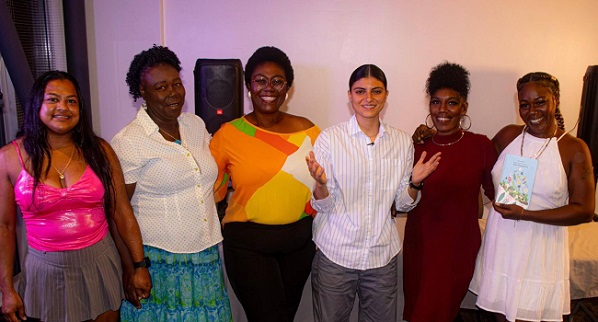

Kim Hendriksen reports for NTR Caribisch Netwerk on a literary project involving immigrant mothers in Curaçao. Here are a translation and commentary by our collaborator from Curaçao, Peter Jordens:
“Curaçao has given my children peace; it has brought us headaches, sunshine, and sometimes storms. Curaçao is our suitcase. Sometimes it opens and we see the sun. Sometimes it closes and we must survive in the dark.” These are the words of a mother from Jamaica, captured by poet Aline Abdul (21) as the coordinator of a project called ‘Mama Baranka’. Six migrant mothers from Haiti, the Dominican Republic, Jamaica, and Colombia shared their experience in a series of literary sessions.
The project was an initiative of Wintertuin Curaçao, which is part of the Wintertuin literary organization in The Netherlands. The platform focuses on strengthening literature and storytelling in the Caribbean, while the project aims to raise awareness about migrant literature and the role of migrants in Curaçaoan society.
Abdul was asked to lead the project because of her own background. She was born in Lebanon, grew up in Curaçao, and knows firsthand how challenging it can become fully accepted. “Even if you adapt and integrate, the label of foreigner tends to stick with you,” she says. “And that sometimes involves painful experiences.”
Abdul facilitated the sessions and transformed the stories into prose and poetry. “There were ten sessions in which we talked about everything that affects their daily life,” she says. “Topics included: clashing norms and values, social control, parenting, finding work, but also the enormous mental strength that these women have. They themselves use that term all the time: Kòrsou ta pidi forsa (Curaçao requires one to be strong).”
The mothers spoke about being grateful that their children can grow up in freedom. At the same time, there is pain. One mother explained that she felt that she had to remove her country of birth from her resume in order to find a job. “Sometimes you must literally erase your identity to get in,” Abdul said. “That can really affect your self-worth.”
More than fifty cultures coexist by and large peacefully on the small island of Curaçao. Whereas in The Netherlands, migration is often a source of political tension, in Curaçao it is primarily a social issue, Abdul explains. “Here you rarely hear political parties calling for fewer immigrants. Of course there is prejudice and rejection, but it does not become political. That makes the experience different.”
For Abdul, literature is the most powerful way to make these stories visible. “I call it a silent revolt. One can protest in the streets, but with literature, one captures one’s experience forever. It is preserved in texts and images.” In addition to creating poetry, the project will produce a documentary. During its filming, the women narrated their own stories, often in Papiamentu, and sometimes in English or Spanish. “That they themselves spoke was the most important thing,” says Abdul.
‘Mama Baranka’ illustrates that motherhood and migration are inextricably linked to the island. The stories clearly show that Curaçao does not belong only to those born there. As the women themselves summarize it: Nos tambe ta yu di tera’ki. Nos tambe ta Kòrsou (We too are children of this land. We too are Curaçao).
Poem by Aline Abdul, based on the story of a mother from Jamaica
Papiamentu
Kòrsou a duna mi yunan ‘pas’, el a duna nos doló di kabes, un brasa di solo anto tin biaha nos
ta sinti un tormenta pasa.
Kòrsou ta nos kaha. Tin biaha e ta habrí, anto nos ta sinti solo sinta banda di nos. Tin biaha e kaha ta sera, anto nos tin ku sinta den skuridat ward’é habri di nobo.
Manera mi a bisa kaba, un balor ku mi ta haña importante ta ‘disiplina’ pero mi yunan no
mester lucha hopi mas, pasobra ami a hasi esei pa nan.
Esei ta hasi mi un mama satisfecho, pero e no ta masha bon pa nan abilidat di disiplina.
English
Curaçao has given my children ‘peace’. It has brought us headaches, an embrace of sunshine, and
sometimes storms.
Curaçao is our suitcase. Sometimes it opens, and we see the sun rise. Sometimes the suitcase closes, and we must wait in the dark for it to open again.
As I said, discipline, the will to move forward, is an important value. But my children need not struggle as much anymore, because I have done that for them.
That makes me a satisfied mother, even though it is not so good for their own sense of discipline.
For the full, original article (in Dutch and Papiamentu), go to https://caribischnetwerk.ntr.nl/2025/10/06/curacao-als-koffer-vol-culturen-migrantenmoeders-vertellen-hun-verhaal-in-mama-baranka
Translation by Peter Jordens.
Translator’s note: The Papiamentu name of the project, ‘Mama Baranka’, was probably used primarily in the sense of ‘Rock-solid Mother’: a strong mother, a mother as strong as a rock. But it could also be interpreted as ‘Mother Rock’, because Curaçaoans often refer to their island as a rock in the sea that is like a mother (motherland). The combination of the two meanings seems appropriate in the context of the project’s themes of migration and motherhood.
[Phot above from Archief Aline Abdu. See https://caribischnetwerk.ntr.nl/2025/10/06/curacao-als-koffer-vol-culturen-migrantenmoeders-vertellen-hun-verhaal-in-mama-baranka]
Kim Hendriksen reports for NTR Caribisch Netwerk on a literary project involving immigrant mothers in Curaçao. Here are a translation and commentary by our collaborator from Curaçao, Peter Jordens: “Curaçao has given my children peace; it has brought us headaches, sunshine, and sometimes storms. Curaçao is our suitcase. Sometimes it opens and we see the






